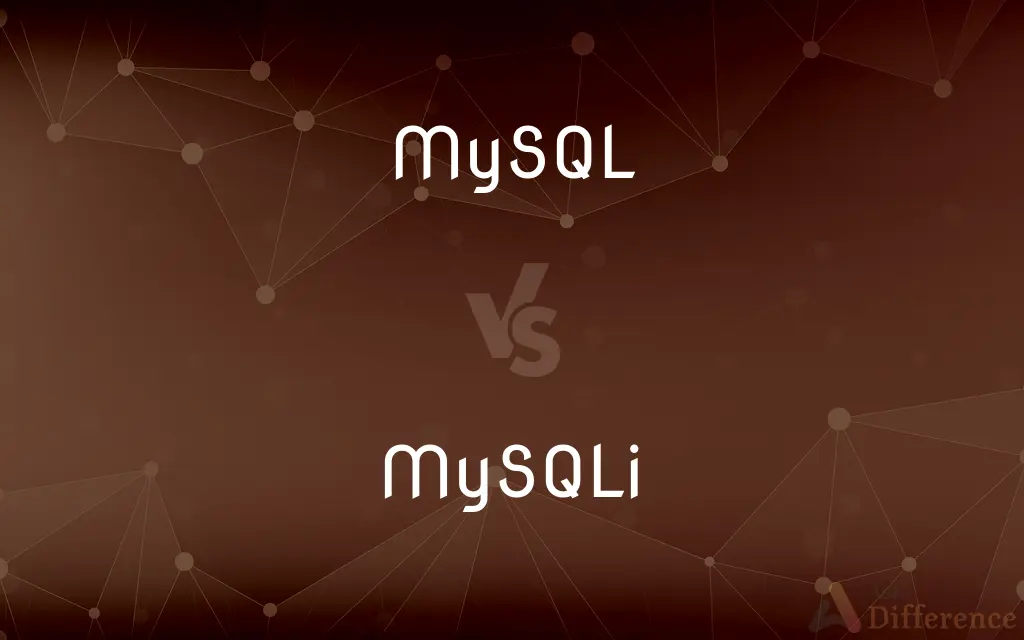MySQL vs. MySQLi — What's the Difference?
By Tayyaba Rehman — Published on January 5, 2024
MySQL refers to the relational database system, while MySQLi is a PHP extension for MySQL database access.

Difference Between MySQL and MySQLi
Table of Contents
ADVERTISEMENT
Key Differences
MySQL is an open-source relational database management system that allows users to store, retrieve, and manage data in structured tables. It is widely used in various applications and websites for data storage purposes. MySQLi, on the other hand, stands for "MySQL Improved" and is a PHP extension that provides an interface to work with MySQL databases.
MySQL was introduced in the mid-90s and has since become one of the most popular database systems in the world. It's known for its speed, reliability, and ease of use. MySQLi, introduced as an improvement over the older MySQL extension in PHP, offers an object-oriented API and supports prepared statements, making it more secure against SQL injection attacks.
While MySQL represents the actual database system, MySQLi serves as a bridge between PHP applications and the MySQL database. This means that while you could have a MySQL database without ever using MySQLi, if you're developing a PHP application and intend to interact with a MySQL database, MySQLi is often the preferred choice.
Both MySQL and MySQLi have their own set of features and benefits. MySQL boasts a large user community, extensive documentation, and a proven track record of performance. MySQLi, with its enhanced security features and improved performance capabilities, offers developers a more modern approach to interacting with MySQL databases through PHP.
It's crucial to note that while MySQL and MySQLi might seem interconnected, they serve different purposes. MySQL is the core database system, while MySQLi is an improved method for PHP applications to interact with that database.
ADVERTISEMENT
Comparison Chart
Nature
Database Management System
PHP Extension for database access
Introduced In
Mid-90s
As an improvement over the MySQL extension
API Type
Doesn't offer object-oriented API directly
Offers both procedural and object-oriented API
Prepared Statements
Doesn't support natively in the older PHP extension
Supports and helps prevent SQL injections
Use Case
Core system to store and manage data
Interface between PHP applications & MySQL DB
Compare with Definitions
MySQL
MySQL is often used in conjunction with web programming languages like PHP.
Web developers commonly pair PHP scripts with MySQL databases for dynamic websites.
MySQLi
MySQLi is an evolution of the older MySQL extension in PHP, providing more features.
As the web evolved, the need for an improved extension like MySQLi became apparent.
MySQL
MySQL operates using structured query language (SQL) to manage data.
Using MySQL, you can retrieve specific information with an SQL query.
MySQLi
MySQLi offers both procedural and object-oriented programming interfaces.
Depending on their preference, developers can use either approach with MySQLi.
MySQL
MySQL is renowned for its fast performance and reliability.
Large enterprises trust MySQL for their critical applications because of its stability.
MySQLi
MySQLi enhances security by supporting prepared statements.
To prevent SQL injections, it's recommended to use MySQLi's prepared statements in PHP apps.
MySQL
MySQL is an open-source relational database management system.
Many websites use MySQL to store user data and content.
MySQLi
MySQLi stands for "MySQL Improved".
With the introduction of MySQLi, PHP developers gained better tools for database interaction.
MySQL
MySQL supports a wide range of platforms including Linux, Windows, and macOS.
Developers appreciate MySQL's versatility across different operating systems.
MySQLi
MySQLi is a PHP extension designed for MySQL database access.
To connect to a MySQL database in a PHP application, developers often use MySQLi.
Common Curiosities
Can I use MySQL without MySQLi?
Yes, MySQL can be used without MySQLi, especially if you're not using PHP.
What is MySQL?
MySQL is an open-source relational database management system.
How is MySQLi related to MySQL?
MySQLi is a PHP extension that provides an interface to work with MySQL databases.
Is MySQLi an updated version of MySQL?
No, MySQLi is not a database system but an improved extension in PHP to interact with MySQL.
Is MySQLi faster than the older MySQL extension in PHP?
MySQLi is designed with improved performance capabilities compared to the older MySQL extension.
Does MySQLi support object-oriented programming?
Yes, MySQLi offers both procedural and object-oriented programming interfaces.
Is MySQLi backward compatible with the older MySQL extension in PHP?
While MySQLi is an improvement, it is a separate extension and some old MySQL functions may not work directly with MySQLi.
Are MySQL and MySQLi the same thing?
No, MySQL is a database system, while MySQLi is a PHP extension to interact with it.
Is MySQL a programming language?
No, MySQL is a database management system that uses SQL, a query language.
Which is more secure: MySQL or MySQLi?
MySQLi offers enhanced security features like support for prepared statements, making it more secure against SQL injection attacks.
Which should I choose for a new PHP project: MySQL or MySQLi?
For new PHP projects, it's recommended to use MySQLi due to its enhanced security and features.
Can I use MySQLi with languages other than PHP?
No, MySQLi is specifically designed as a PHP extension for MySQL database access.
Why was MySQLi introduced?
MySQLi was introduced to provide a more secure and efficient way for PHP applications to interact with MySQL databases.
Can I use prepared statements with MySQL?
Directly with MySQL, no, but using the MySQLi extension in PHP, yes, you can use prepared statements.
What does the "i" in MySQLi stand for?
The "i" in MySQLi stands for "Improved".
Share Your Discovery

Previous Comparison
Open Chain Hydrocarbons vs. Closed Chain Hydrocarbons
Next Comparison
Gingelly Oil vs. Sesame OilAuthor Spotlight
Written by
Tayyaba RehmanTayyaba Rehman is a distinguished writer, currently serving as a primary contributor to askdifference.com. As a researcher in semantics and etymology, Tayyaba's passion for the complexity of languages and their distinctions has found a perfect home on the platform. Tayyaba delves into the intricacies of language, distinguishing between commonly confused words and phrases, thereby providing clarity for readers worldwide.













































